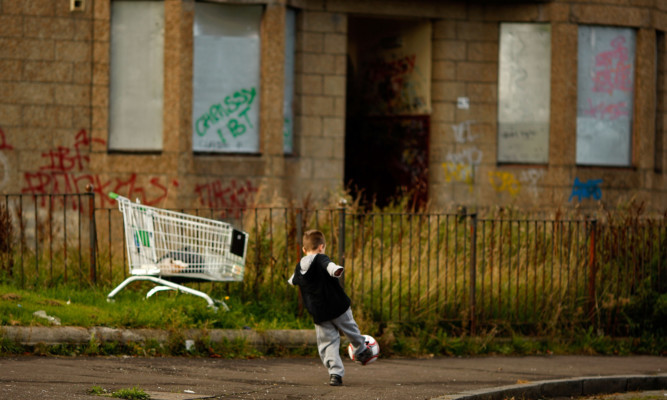Scotland’s poorest households could be more than £500 a year worse off in 2020 as a result of changes made in Chancellor George Osborne’s budget, new research has found.
While 800,000 households north of the border will have less cash as a result, analysis by the new IPPR Scotland think-tank found there would be more winners than losers, with some 1.3 million households expected to be better off.
But while the richest 20% of households will gain £110 a year by 2020/21, the impact of tax and benefit changes on the poorest 20% of households will see them lose an average of £520 a year.
Single parents will be those worst affected, losing more than £1,500 on average each year, according to the analysis.
The think-tank looked at the impact of changes made by the Chancellor in what was the first Conservative budget for almost two decades, with IPPR Scotland focusing on the effect on households north of the border.
It found that the impact of the new national living wage and planned tax cuts would be vastly outweighed by reductions in tax credits.
Russell Gunson, director of the newly-launched IPPR Scotland, said: “This is the first time that a tax and benefit analysis of George Osborne’s budget has been applied to Scotland and it shows his decisions will have a huge impact on the poorest in Scotland.
“Over 800,000 households will be worse off, with some losing over £500 per year. We have heard a lot about the positive impact of the rising national Minimum Wage, but for low and middle income Scottish families this is vastly outweighed by the negative impact of tax credit reductions.”
The think-tank published its analysis as Scottish Secretary David Mundell said the Scottish Government would be given the power to top up tax credits from 2017, as part of the changes being taken forward in the new Scotland Bill.
Mr Gunson added: “This may be a decision that was made in Westminster, but how it can be reversed in Scotland is a clear challenge to the whole of the Scottish Parliament. As we look ahead to the Scottish Parliament making its spending decisions over the coming months, everyone must have the effects of these decisions, and in-work poverty more generally, in the forefront of their minds.”
SNP MSP, Kevin Stewart, a member of Holyrood’s Welfare Reform Committee, said:”These new figures are the latest to confirm that George Osborne’s summerbudget will hit the poorest hardest, with the poorest 20% of households inScotland losing £520 per year compared to a gain of £110 for the top 20%.
“Despite the Chancellor’s Living Wage con-trick 800,000 people will lose out because of his callous social security cuts – and those who will benefit are concentrated amongst the top 40% of earners.”
He added: “This was not a budget for tackling poverty and raising income – it was a budget for boosting inequality.”
Scottish Labour public services spokesperson Jackie Baillie said the research showed the Conservatives to be “Robin Hood in reverse, taking from the poor to give to the rich”.
She stated: “This expert research has confirmed that the Chancellor’s plans to slash tax credits will hurt the poorest families in Scotland whilst the richest will see more money in their pocket.”
Ms Baillie added: “After five years of the Tory Government and eight years of the SNP Government, the gap between the richest and the rest in our country is still unacceptably high, these cuts will only make it worse.”
Scottish Liberal Democrat leader Willie Rennie said: “It is no surprise that the first true blue Tory budget in 18 years will see the rich get richer and the poor get poorer. The attack on tax credits will have a hugely damaging impact on families working hard to make ends meet. That is the reality of what the Tories are doing.”
He added that Scottish Tory leader Ruth Davidson “cannot wash her hands of these damaging cuts”, with Mr Rennie stating: “She needs to tell her colleagues to end their bone-headed, ideological attacks on working families.”
